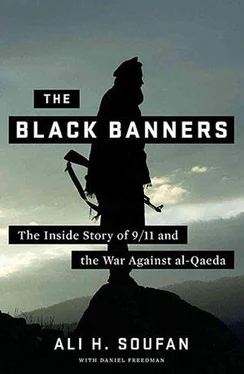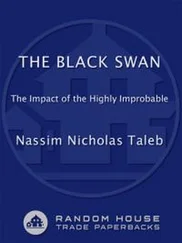John and I had spent the previous few hours discussing a memo I had written on a figure then little-known outside government circles, Osama bin Laden, who had just issued a fatwa declaring war against America. It was this memo that had brought me—a rookie in the bureau—to the attention of John, one of the most senior members in the office. Someone of my standing would usually have had to go through several chains of command to reach John O’Neill.
We had just finished dessert, and John was cradling his preferred drink, Chivas Regal with seltzer. His question signaled that he was done talking terrorism and now wanted to get to know me as a person. This was something he liked to do with all new agents he took under his wing, a colleague had told me. The question appeared to be a good sign.
The thought that he was considering taking me under his wing made me smile inwardly. John was an FBI legend and was known to be one of the few senior U.S. government officials who understood the necessity of making counterterrorism a national priority. To others, the war on drugs, foreign governments spying on us, and other nonterrorism-related matters were of greater concern. For anyone who believed, as I did, that a response to acts of terrorism carried out by violent Islamist groups needed to be prioritized, working alongside John was where you wanted to be.
“Sure, boss,” I answered. “What’s your question?”
“What I want to know, Ali,” he said, leaning forward and looking at me and swirling his drink in the palm of his left hand, “is why did you join the bureau? What led you, a boy born in Beirut, from a family of intellectuals, to our ranks? You’re not a typical recruit.” Ending with a statement rather than a direct question was customary for John, and on that note he gave a quick smile, leaned back in his chair, and took a sip of his drink.
I studied John as he asked the question. He was, as usual, immaculately dressed, wearing one of his trademark double-breasted suits and expensive brogues, with a Rolex watch on his wrist. John didn’t dress like a typical government employee. He valued looking good over saving for the proverbial rainy day (government salaries don’t allow both).
I noticed the bulge near his left ankle as he leaned back and stretched out his legs. While John was too senior to be a street agent knocking on doors asking questions anymore, like any good agent he always kept his weapon by his side. In John’s case it was a 9 mm gun. He didn’t mind if people saw it, either: in truth, it could have been pushed a bit more discreetly toward his inner leg, but along with being a classy dresser John also cultivated a tough-guy persona—perhaps to show he wasn’t a typical senior manager and was still “one of the boys,” or even to intimidate people, if necessary.
While John did have an element of showmanship to him, he was one of the hardest-working and most effective senior agents in the bureau. “When you’re that good, you can be a tough guy and wear expensive suits. Apparently it works,” I once told a colleague who criticized John’s appearance and affect.
John’s question made me slightly nervous. I laughed, struggling to appear at ease. I was trying hard to make a good impression, and my answer wasn’t the typical “I-always-wanted-to-join-the-bureau-from-when-I-was-a-little-kid-because-I-want-to-protect-our-country-and-the-FBI-is-the-best” that most supervisors would have wanted to hear—and what most people in my shoes would have given.
John wasn’t a typical supervisor. His conversation with me was laced with no-nonsense blunt talk and honesty about successes and failures, and he didn’t shy away from profanities. My instinct was that John probably wouldn’t like a soppy answer anyway. But I was still with someone far higher than me, and part of me felt the temptation to play it safe.
That part of me lost the debate going on inside my mind. “You’re not going to believe me,” I said, trying to find a way in.
“Try me,” John responded.
I took a sip of my drink. “Well,” I said, “it was a bet…”
“A bet?” John repeated, raising his left eyebrow.
“Yes,” I replied with a guilty grin. “My fraternity brothers made a bet with me, and with each other, on how far I could get through the bureau’s selection process. I never expected to make it all the way, but I passed every level, even the polygraph…” I paused. “And when the offer came from the bureau it was too tempting to pass up, and here I am today.”
“You’re kidding me,” John said, and then started laughing. “Well, I see you’re honest—I like that, ha!” He shook his head, still smiling. “Cheers,” he continued, raising his glass, and we both downed the remainder of our drinks. He added, with his signature smile, “And they say gambling doesn’t pay off.”
My path to the FBI did start as a bet. I got my undergraduate degree at Mansfield University, in rural Pennsylvania, and there the vice president of student affairs, Joe Maresco—with whom I had a close relationship, as I was president of the student body—suggested, during a conversation about my prospects, that the perfect job for me might be working for the FBI.
I thought he was crazy. I didn’t think I met the profile of an agent. I was an Arab American born in Lebanon. I was also a fraternity boy, and I enjoyed all the revelry that entailed. I certainly didn’t fit in with the straitlaced white bureau types I envisioned—an image shaped by television shows. Nor had I ever considered a career in law enforcement or intelligence. It was as if Joe had suggested I join the circus or become a Formula One race car driver—it had never crossed my mind.
As I walked through the door of my fraternity house after my conversation with Joe, a few of my housemates were sitting on the couches, watching television, and I repeated, half-laughing, his career recommendation. They started laughing, too. “If you send in an application you’ll probably get it back in the mail a few weeks later marked ‘Return to Sender,’” one guy said. Another chimed in: “You won’t even pass the physical.” A third added: “They’ll probably think it’s a joke application…”
“I think he could do it,” another countered. “If he could convince everyone in the university to raise funds for a new student center, he could convince some drug dealers to come clean.” He was referring to a campaign I had led persuading everyone, from the students to the school administration, to donate to the building cause.
And the debate began, with no one, including myself, taking Joe’s advice seriously.
Still, for the next few days I reflected on what Joe had said and began to find myself intrigued: now that I thought about it, a career in the FBI could be exciting. More than that, my nature has always been to not accept that there is something I can’t do, and my fraternity brothers’ insisting that I had no chance was such a challenge. I was always the child who, given a dare, accepted it. I got that partly from my father, who loved adventures, and it was partly due to the circumstances of my childhood: the Lebanon of my youth was a war zone, and, after that, things like the dark or being locked in a closet just didn’t frighten me. One of my earliest war memories is of hugging the bottom of the stairs in my house as bombs exploded in our neighborhood. (The center of a house, where the stairs were, was said to be the safest part.) We would huddle silently, listening as windows shattered and rubble fell. Sometimes, after what seemed like an eternity of silence, screams would shatter the quiet as people discovered dead bodies and severely injured loved ones.
My father used to tell me what Lebanon was like before the civil war, when Beirut was the Paris of the Middle East, as people liked to say, and when the country was renowned for its culture, intellectuals, and natural beauty; but I never knew that country. I grew up in a land that was a country only in name. Part was occupied by regional powers, and the rest was divided among different Lebanese ethnic and religious groups who ran their areas like feudal fiefdoms. Turf wars broke out regularly, and the losers were always ordinary civilians. I remember once crouching on the floor of our house as two militias battled each other from the two ends of our street, and we didn’t know when it would end, or if we would survive. Everyone in Lebanon knew someone who was killed in the violence. I lost two classmates in a single semester in fifth grade.
Читать дальше












